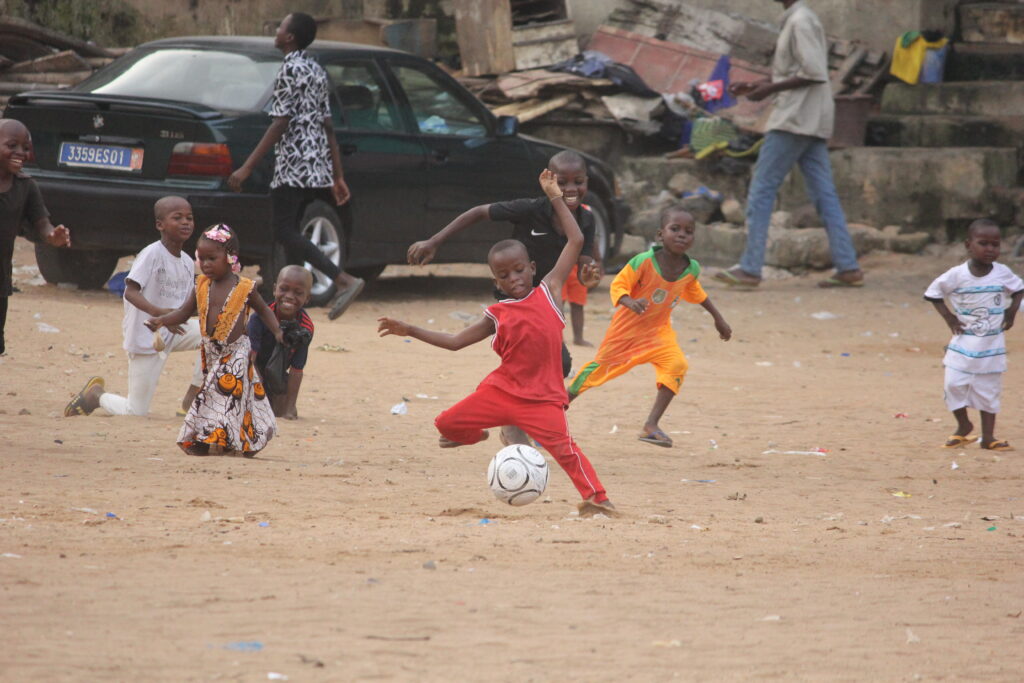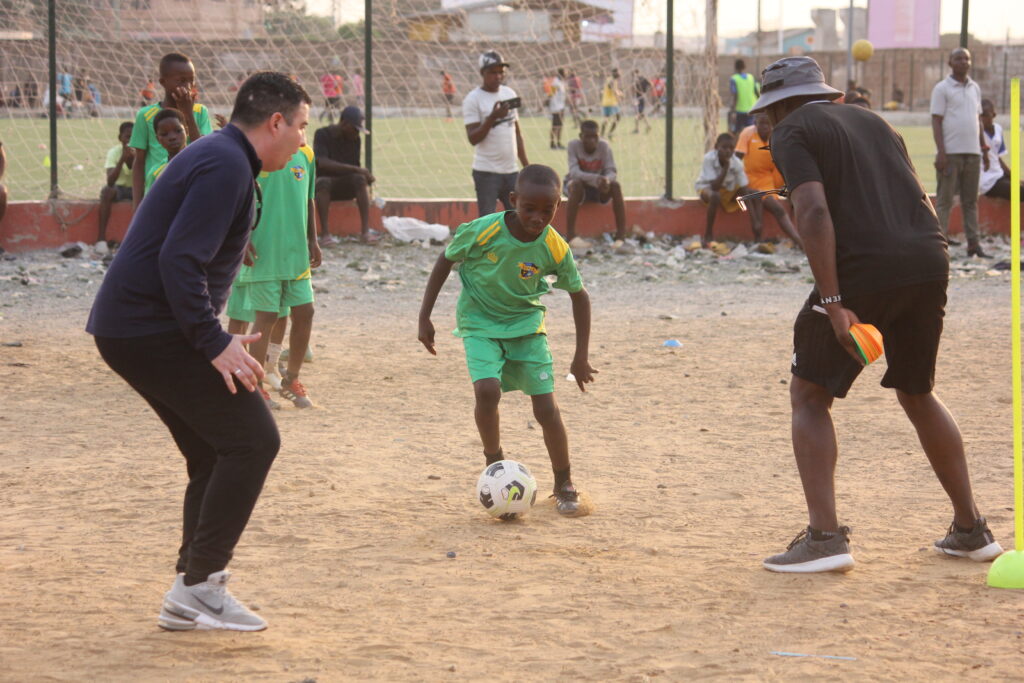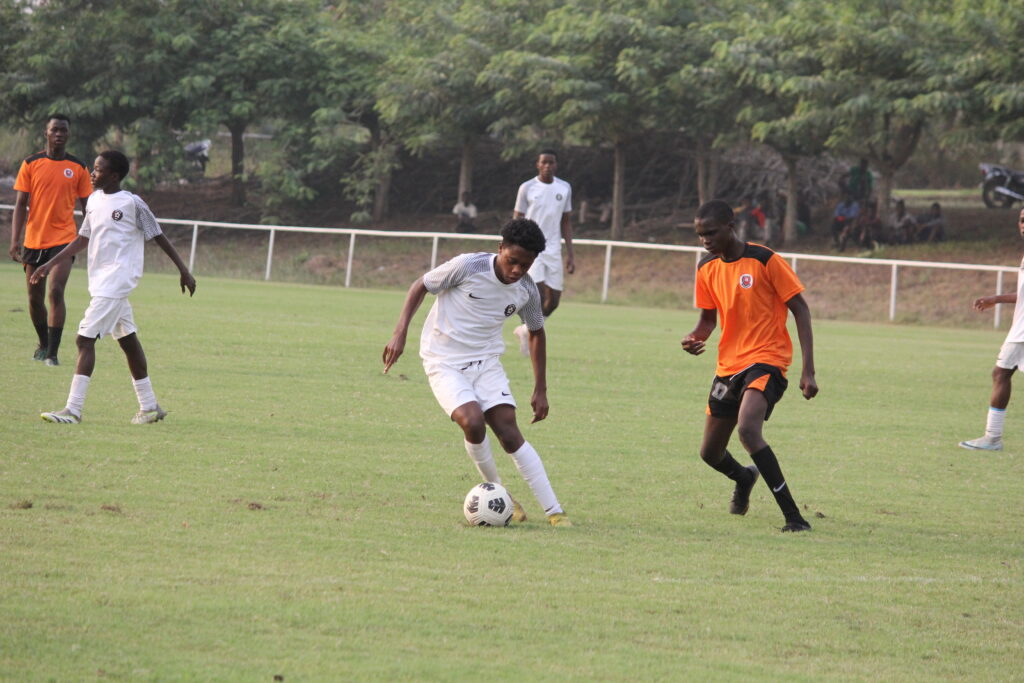NorCal West Africa Coaching Education Trip Recap

Over the course of two weeks last month, 12 youth soccer coaches with ties to NorCal Premier Soccer ventured on the journey of a lifetime, exploring the soccer culture in West Africa in the hopes of returning to their clubs with knowledge gained to help improve the standard of play locally.
Split in between visits to Ghana and Côte d’Ivoire, the dozen spent their time attending youth training sessions, visiting amateur academies and professional clubs, exploring street football culture, and watching matches at the 2023 Africa Cup of Nations, the continent’s biannual international championship.
“Part of the coaching education is providing license courses and bringing in high-level clinicians to show best practices on the field from the top level of the world’s game,” said NorCal Director of Operations and trip organizer Andy Farrant. “But another part of it is traveling to different cultures to see how other parts of the world organize their football. Seeing what football means to the people in the country, the culture of the country, and to learn from those cultures is paramount for us to see so we can bring those things back to Northern California to try to improve the football landscape where we live.”
The trip began with four days in the Ghanaian capital of Accra, where NorCal watched several third division teams train and play, met with the Ghana FA in their headquarters, and worked with youth clubs such as Strong Tower FC in the Nima district of the city.
One of the standout moments during that part of the trip came when coaches Shawn Blakeman, Cris Gilmore, Jesus Mata, Jovan Yamagishi, and Benjamin Ziemer ran a training session with the Strong Tower FC players after donating multiple bags of gear to the club provided by NorCal and the nonprofit Second Touch Soccer.
From there, the action shifted to Ghana’s francophone neighbor, Côte d’Ivoire, which was hosting the 34th edition of the Africa Cup of Nations.
Throughout a five day period, the 12 coaches took in seven different international matches, a youth tournament between professional academies, and visited and coached a session with Abidjan youth club Gladiator FC.
For many of the coaches, though, some of the most profound moments came just through watching the plethora of pickup games that popped up on the streets, dirt fields, beaches, or anywhere kids could find a place to emulate their favorite stars from Les Éléphants, the senior national team.

“I’ve never had the chance to study the game from an African perspective before and when we got there, I realized from all of my experiences around the world that we’re all products of our environment,” said Gilmore, a former NorCal employee who has since moved on to become the Technical Director for SOCAL Soccer League. “It’s incredible what these kids can do, with the quality of their facilities, their lifestyle, culture of hustling to survive every day. It’s evident on the field. What impressed me so much was their intensity, urgency, will to fight and make a difference on the field. They never stop, they never take a play off.”
“Because the surfaces of the streets and the sidewalks where they live and play are so uneven, the players become incredibly athletic and their touch is immaculate with all surfaces of their body,” Gilmore added. “Just walking around in Abidjan, we saw so many different street soccer environments on these difficult surfaces and everyone was battling with every ounce of their energy. The tackles, the explosiveness, the energy that was put in to win was incredible. That’s where the product of the environment comes out.”
“Here, too often we see many of our kids take plays off, and some coaches let our kids take plays off and that’s a product of our environment,” he concluded. “I didn’t see a single kid take a play off because in my opinion they’re trying to get out. I believe a lot of them have that dream to get out of the slum, and the game is their way.”
Gilmore was the one representative from Southern California as part of NorCal’s continued partnership with SOCAL that hopes to see the two halves of the state come together to play games against each other, exchange ideas, and grow the game in all of the Golden State.
He, along with the 11 other coaches, then flew back to Ghana to visit Right to Dream, arguably one of the top-10 youth academies in the world.

Over the course of four days, NorCal watched the youth players at Right to Dream train twice a day before playing in matches against other Ghanaian youth teams over the weekend.
Additionally, the dozen visited the academy’s school and learned about how the program works through conversations with all members of their key staff.
“It was incredibly powerful for the coaches to be able to live within the academy for four days, to live within the culture, and to see the elite level football performance isn’t only focused on the pitch,” said Farrant, who used to work for Right to Dream as a scout. “The Right to Dream philosophy is focused on education and character development as much as football.”
“For the coaches to be able to witness a philosophy that’s lived and implemented by every single member of the staff on a daily basis, and the openness and welcoming of everyone involved in the academy,” Farrant said, “shows that you can perform at the highest level of the game while not shying away from the importance of education, the importance of teaching life lessons and character skills through the game, which sometimes can get lost in elite level youth development.”
Overall the trip qualified as a deep dive into the culture and football language of West Africa, a region of the world obsessed with the beautiful game and one of the globe’s true hotbeds of talent.
But for some, the lessons off of the field will also leave a lasting impression.
“The warmth of the people in this region is infectious–they make you feel very welcome in their own country,” Farrant said. “When you combine that with a shared love of football, it’s a very powerful thing to be involved in.”
“NorCal Premier President Benjamin Ziemer speaks about the ball and the game being a passport to different cultures around the world and that’s very true here,” Farrant added. “When you travel and you’re genuinely interested in learning about another culture through sport it opens your eyes and you can see how the game reflects a country’s culture and values, what the sport means to the people, and how young people are raised through the sporting community. Hopefully we can take those lessons home to continue improving the game in Northern California with this experience.”












